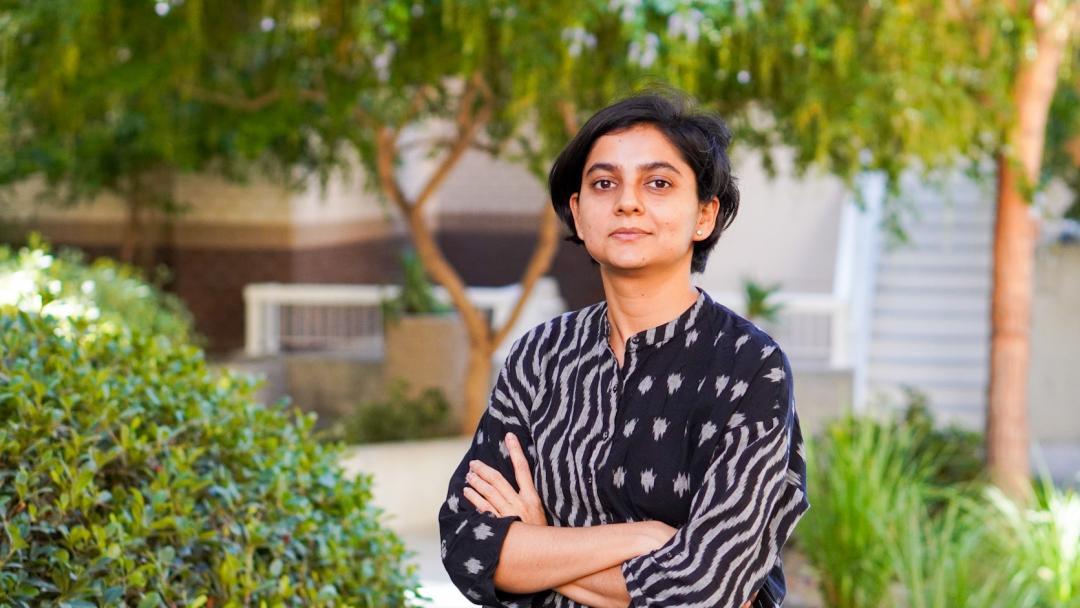
While on the doctoral path in the UC Irvine Department of Urban Planning and Public Policy, Sridipta Ghatak has often drawn from the work of environmental policy scholars associated with the Association for Public Policy Analysis and Management.
“I came across the abstract of one such research article presented at a previous APPAM conference,” recalls Ghatak. “That’s how I found out about the conference and the fellowship, which looked like a great opportunity for budding scholars like me.”
Indeed it is as Ghatak was recently named a 2024 APPAM Equity & Inclusion Fellow, which included being feted with other fellowship recipients during November’s Annual Fall Research Conference in National Harbor, Maryland.
“The Equity & Inclusion Fellowship program supports the participation of students from traditionally underrepresented backgrounds at the Annual Fall Research Conference,” states the APPAM. “The goal of this fellowship program is to introduce recipients to the world of public policy and APPAM and foster a lifelong affiliation and engagement with both.”
Ghatak’s research examines how the interaction between community-based climate adaptation policies and emerging regional market economies influences household decision making in socio-ecologically vulnerable communities.
“My dissertation formulates a theoretical framework and a mixed-method design to assess the equitability of local adaptation policies, which I call ‘adaptation equity,’ ” explains Ghatak, who is on track to earn her Ph.D. in Spring 2026. “I measure adaptation equity outcomes at the household level in community-based groundwater management in peri-urban areas, with particular focus on the organizational and behavioral mechanisms that influence equity outcomes.”
Her research is based on 16 months of fieldwork in India, where she yielded a novel dataset comprising survey responses, participatory process tracing, interviews, and document analysis.
“I draw from literature on environmental justice, street level bureaucracy, and suburban inequality,” Ghatak says. “More generally, I am interested in how place-based adaptation policies interact with existing social structures of gender, class, race, religion, caste, citizenship and status of work, among others.”
The Ph.D. candidate’s previous research investigated the politics of public-private partnerships in urban infrastructure development, comparative analysis of peri-urban development in the global south, good practices in municipal urban physical infrastructure in high-density cities, transit-oriented development, and women’s participation in higher education and the job market. Ongoing research examines data equity in heatwave mitigation planning, comparative analysis of sea-level rise adaptation, and gendered barriers to higher education.
Earlier in the year, before receiving the APPAM fellowship, Ghatak earned the John M. Whiteley Fellowship, which is awarded to the best research proposal submitted from the School of Social Ecology to UC Irvine’s Center for Global Peace and Conflict Studies.
“I received the Whiteley Fellowship rather unexpectedly for my comparative work on climate adaptation policies in India and Bangladesh, which are neighboring countries with similar geomorphology and agroclimatic condition but widely varying federal and state policies to tackle climate change,” Ghatak says. “I always valued comparative scholarship work but understand that it is quite a task to pull off a robust comparative analysis in a doctoral dissertation. That is why, when CGPACS presented the grant opportunity, I took advantage and proposed a comparative study by extending my ongoing dissertation research.”
Obviously, that was a smart move.
“It feels great to be acknowledged and rewarded for that attempt,” Ghatak says. “I already received some astute ideas to further this strand of my research from Dr. Kamal Sadiq, director of CGPACS, when I met him at their Fall welcome event earlier this quarter.”
Sadiq is not the only campus scholar who has impressed Ghatak.
“My experience at UCI has been nothing short of adventurous,” she says. “I not only learnt invaluable research skills but have learnt several life skills which enriched my experience as an international graduate student worker in the USA. This is a great opportunity to appreciate my brilliant advisor Dr. Walter Nicholls, who is the model personification of academic rigor, flexibility and kindness of the best kind that an advisee can ask for. He has held me to the highest standards while allowing me to deeply engage with the wide plethora of research interests with which I arrived at UCI.”
She also extended gratitude to Nicholls’ fellow urban planning and public policy professors Richard Matthew, Doug Houston, Mike Méndez, Dave Feldman, Mukul Kumar and Maria Rendón for supporting Ghatak’s Ph.D. journey. Outside of UP3, Ghatak singled out professors Ana Muniz (criminology, law & society), Salvador Zarate (anthropology), Edward Telles (sociology), Ann Hironaka (sociology), Danielle Thomsen (political science), Paul Dourish (informatics and computer science), Jone Pearce (organization and management) and Connie Pechmann (marketing).
“My dissertation relies heavily on Dr. Samantha Vortherms’ guidance, encouragement and hours of meetings, and for that I am ever grateful,” Ghatak says of the assistant professor of political science.
She also praises her fellow graduate students for being “sources of inspiration,” with “a special shout out” to Zayda Sorrell-Medina “for being my sounding board and a great friend since my very first day in Irvine.” (Sorrell-Medina, who earned a Ph.D. in urban and environmental planning and policy in 2023, is now an assistant professor of social work at Cal State Northridge.)
Among the experiences Ghatak has most cherished at UC Irvine (so far) was independently teaching the Environmental Analysis and Design (UPPP 8) course last summer.
“I thoroughly enjoyed the experience with my students, who were enthusiastically engaged even in an online classroom setting,” she says. “This experience is particularly meaningful as it allowed me to combine research insights with teaching a group of students who were eager to contribute to the world of policy applications.”
Ghatak also appreciates the “several opportunities to contribute to graduate student life by serving in various capacities within different programs at UCI’s Graduate Division, which continues to serve as a reminder of my purpose as a member of the broader academic community committed to diversity and inclusion in practice.”
— Matt Coker